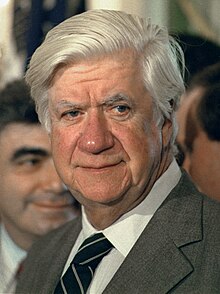
Back تيپ اونيل ARZ تیپ اونیل AZB Tip O’Neill German تیپ اونیل Persian Tip O’Neill Finnish Tip O'Neill French טיפ אוניל HE Tip O'Neill (politico) Italian Tip O'Neill Dutch Tip O’Neill NB
Tip O'Neill | |
|---|---|
 O'Neill in 1978 | |
| 47th Speaker of the United States House of Representatives | |
| In office January 4, 1977 – January 3, 1987 | |
| Preceded by | Carl Albert |
| Succeeded by | Jim Wright |
| Leader of the House Democratic Caucus | |
| In office January 4, 1977 – January 3, 1987 | |
| Preceded by | Carl Albert |
| Succeeded by | Jim Wright |
| House Majority Leader | |
| In office January 3, 1973 – January 3, 1977 | |
| Deputy | John J. McFall |
| Speaker | Carl Albert |
| Preceded by | Hale Boggs |
| Succeeded by | Jim Wright |
| House Majority Whip | |
| In office January 3, 1971 – January 3, 1973 | |
| Leader | Carl Albert |
| Preceded by | Hale Boggs |
| Succeeded by | John J. McFall |
| Member of the U.S. House of Representatives from Massachusetts | |
| In office January 3, 1953 – January 3, 1987 | |
| Preceded by | John F. Kennedy |
| Succeeded by | Joseph P. Kennedy II |
| Constituency | 11th district (1953–1963) 8th district (1963–1987) |
| Speaker of the Massachusetts House of Representatives | |
| In office 1949–1953 | |
| Preceded by | Frederick Willis |
| Succeeded by | Charles Gibbons |
| Minority Leader of the Massachusetts House of Representatives | |
| In office 1947–1949 | |
| Preceded by | John Flaherty |
| Succeeded by | Charles Gibbons |
| Member of the Massachusetts House of Representatives from the 3rd Middlesex district | |
| In office 1937–1953 | |
| Personal details | |
| Born | Thomas Phillip O'Neill Jr. December 9, 1912 Cambridge, Massachusetts, U.S. |
| Died | January 5, 1994 (aged 81) Boston, Massachusetts, U.S. |
| Resting place | Mount Pleasant Cemetery, Harwich Port, Massachusetts, U.S. |
| Political party | Democratic |
| Spouse |
Mildred Miller (m. 1941) |
| Children | 5, including Thomas |
| Education | Boston College (BA) |
Thomas Phillip "Tip" O'Neill Jr. (December 9, 1912 – January 5, 1994) was an American Democratic Party politician from Massachusetts who served as the 47th speaker of the United States House of Representatives from 1977 to 1987, the third-longest tenure in history and the longest uninterrupted tenure. He represented northern Boston in the House from 1953 to 1987.
Born in North Cambridge, Massachusetts, O'Neill began campaigning at a young age by volunteering for Al Smith's campaign in the 1928 presidential election. After graduating from Boston College, he won election to the Massachusetts House of Representatives, where he became a strong advocate of Franklin D. Roosevelt's New Deal policies. He became Speaker of the Massachusetts House in 1949 and won election to the United States House of Representatives in 1952 to succeed John F. Kennedy.
In the U.S. House, O'Neill became a protégé of fellow Boston Representative John William McCormack. O'Neill broke with President Lyndon B. Johnson on the Vietnam War in 1967 and called for Richard Nixon's resignation in light of the Watergate scandal. He quickly moved up the leadership ranks in the 1970s, becoming House Majority Whip in 1971, House Majority Leader in 1973, and Speaker of the House in 1977. With the election of President Jimmy Carter, O'Neill hoped to establish a universal health care system and a guaranteed jobs program. However, relations between Carter and Congress deteriorated, and Carter lost re-election in the 1980 presidential election to Ronald Reagan, a conservative Republican. O'Neill became a leading opponent of President Reagan's conservative domestic policies, but O'Neill and Reagan found common ground in foreign policy, fostering the Anglo-Irish Agreement and implementing the Reagan Doctrine (despite considerable opposition to Reagan's support for the Contras in Nicaragua) in the Soviet–Afghan War.
O'Neill retired from Congress in 1987 but remained active in public life. He published a best-selling autobiography and appeared in several commercials and other media. He died of cardiac arrest in 1994.